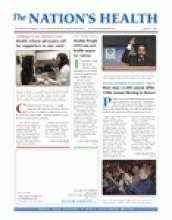More than 17 million American households had difficulty putting enough food on the table in 2009, and federal food assistance programs continue to provide an important safety net, according to a recently released national report.
Released in mid-November by the U.S. Department of Agriculture’s Economic Research Service, the report found that in more than a third of households reporting difficulty in providing enough food in 2009, at least one member did not get enough to eat at some time during the year and normal eating patterns were disrupted due to limited resources.
“This report highlights just how critical federal nutrition assistance programs are for American families in need,” said USDA Under Secretary for Food, Nutrition and Consumer Services Kevin Concannon. “We anticipate that food security will improve as the economy improves, but in the near term, without these benefits, many families would face far more severe problems getting the nutritious food they need.”
The report found that food insecurity was more common in large cities and urban areas. Hunger rates were much higher than the national average among households at or near the federal poverty line, households with children headed by single parents and black and Hispanic households.
USDA officials said that while 17.4 million households faced food insecurity in 2009, the fact that the number remained relatively unchanged from the previous year despite a significant increase in unemployment and poverty underscored the important role of federal nutrition assistance programs in helping to prevent hunger. Almost 60 percent of food-insecure households participated in one or more of the three largest federal nutrition assistance programs within the previous month, according to the report.
Between 2008 and 2009, the number of people seeking help from federal food programs swelled to record levels, the report found. For example, average monthly participation in the Supplemental Nutrition Assistance Program, formerly called the Food Stamp Program, grew almost 19 percent, or by about 5.3 million people. More than 400,000 additional people participated in the Women, Infants and Children program in an average month in 2009, an almost 5 percent increase from 2008.
Also, food donations through the Emergency Food Assistance Program increased by $100 million as a result of the federal Recovery Act. That money bought food that was provided to thousands of food pantries and other emergency feeding organizations nationwide.
“The administration remains strongly committed to nutrition assistance as an essential support for low-income people,” Concannon said. “Despite recent program growth, we recognize that some eligible people in need do not take full advantage of the benefits available to them.”
He said USDA officials are working closely with states to adopt policy changes and practices that improve access and expand participation for people who could benefit from federal nutrition assistance programs. Those include giving communities and localities authority to operate summer food programs in schools and pilot programs to test ways to improve food access for the elderly.
The full report, “Food Security in The United States 2009,” is available at www.ers.usda.gov/publications/err108. More on federal nutrition assistance programs is available at www.fns.usda.gov.
- Copyright The Nation’s Health, American Public Health Association









